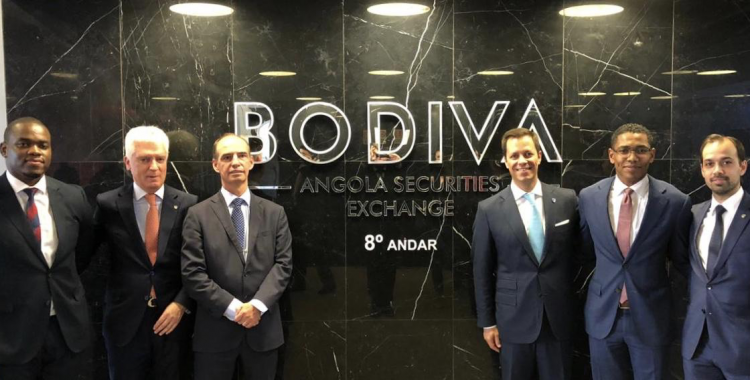There is a correlation between levels of financial education and the "popular" consideration of whether or not a market is "elitist". That is, the greater the level of financial education of a population, the greater will be the allocation of their savings to financial instruments linked to the capital market.
The Organization for Economic Cooperation and Development – OECD (2005) conceptualizes financial education as the process by which consumers of financial services and investors increase their understanding of financial products, concepts and risks.
In the framework of the approach to financial education in Angola, the main variables are linked to the banking sector, where access to a bank account is used in many approaches, as the fundamental element for determining the level of financial literacy.
Accordingly, in line with the Financial System Development Project - PSDSF (2018-2022) and the National Plan for Financial Inclusion - PNIF (2018-2022), in 2020 a joint effort was carried out between the BNA, the National Council for Financial Stability and the World Bank and which resulted in the presentation of the Survey on Financial Capacity and Consumer Protection in Banking.
This survey determined that by the year 2020, 50% of the Angolan population already had access to a bank account, with only 20% left to reach the target agreed with the World Bank. Another relevant piece of information from the survey is that more than 90% of the Angolan business sector continues to opt for service at the branch level in relation to the digital channels mainly offered by the Bank.
However, if at the level of the banking sector, the above-mentioned survey allows us to have a view that the number of open bank accounts may be a limited variable and not exactly presupposing firm steps towards the development of financial education, it becomes imperative in this way. the execution of more precise actions towards the "digital literacy" of the population.
On the other hand, if in the dimension of the banking sector the challenge of financial education is considerable, at the level of the capital market the challenge is greater, becoming an imperative front to be analyzed and studied with great attention, as it could be decisive for the success of actions that are being prepared.
It is important to point out that the challenges of financial education in Angola in terms of the capital market, at this moment, present a certain delay in relation to banking, this because the market is still very recent. That is, we are talking about a supervisory structure of around nine (9) years, a stock exchange of around seven (7) years, a market still dominated by public debt instruments. Accordingly, the Capital Markets Committee launched, on October 12, 2020, the Survey on the Level of Financial Literacy and the Investor's Profile, which can certainly serve as a basis for defining policies within the scope of broadening the base. of investors.
By simplifying the capital market in Angola, our focus will be on the securities market, which at this stage is considered the apotheosis of the capital market in Angola.
In this context, we believe that any approach on "How to Invest in Securities?" should answer the following questions:
- Why should we invest in securities?
- What are the conditions for investing in securities?
- What are the available channels for investing in securities?
- Why should we invest in securities?
Without prejudice to the profile that investors may present (conservative, moderate or aggressive), as well as the respective qualification (institutional or non-institutional), fundamentally, when investing in securities, investors take into account the following reasons:
- Profitability of savings: In this dimension, essentially investors are very attentive to the yield (rate of return) of the investment made.
- Diversification of the investment portfolio: Banking products with an exclusively banking component may, in some cases, offer a return below that of securities (Public Debt Instruments, Private Debt Instruments, Shares, Participation Units). Thus, some investors, in order to share the risks associated with investments, have the securities market as an alternative channel to banking.
- Guaranteed security: As mentioned above, at this stage of development, the Angolan securities market is substantially composed of public debt securities, which implies zero credit risk. That is, by virtue of the characteristics of the Issuer (State), the investor will be less exposed to events related to the non-repayment of their investment under the foreseen conditions.
What are the conditions for investing in securities?
Fundamentally, the investor should pay attention to the following conditions:
- Amount to invest: Without prejudice to the administrative aspect of each institution, regarding the minimum amount for the available channels, we list some notes considering only the nominal value of the security:
- Treasury Bills: Nominal value - KZ 1000.00
- Non-adjustable Treasury Bonds: Nominal value – KZ 100,000.00
- Bonds Indexed to Treasury Bills: Nominal value – KZ 100,000.00
- Treasury Bonds Indexed to Exchange Rate - Nominal value indexed to the AOA/USD exchange rate
- Private Obligations (Overdue) - KZ 100,000.00
- Participation Units – The minimum subscription amount is generally made public by the Management Company of Undertakings for Collective Investment or the entity that sells the Up's.
- Custody Account: The custody account is the individual securities registration account. That is, the investor, when investing in a security, must have an "account" where the securities will be available and this account is called a custody account. The custody account must be opened with the BODIVA Member (The list of Members is available on the respective institution's website – www.bodiva.ao )
- Instruction: The investment should only take place through the instruction or guidance that the investor transmits to his bank or broker. It is next, if there is an intention to invest, the investor must contact his bank where he has the custody account domiciled or that he wants the custody account to be created in that institution and present his investment intention (Order/bidding) .
What are the available channels for investing in securities?
Without neglecting the administrative aspects inherent to institutions linked to the securities market, currently the available channels are as follows:
- Investor Portal (Primary Market);
- Primary Market Auctions;
- Secondary Market (BODIVA Markets)
- Stock Market – Transactions carried out in a multilateral environment
- Organized Over-the-Counter Market – Operations carried out in a bilateral environment
| Investment Channels | |||
| Steps | Investor Portal | Primary Market Auctions |
Secondary Market (BODIVA Markets) |
| 1.º | Access the Investor Portal | Contacting a commercial bank | Contacting a BODIVA member (broker/commercial bank) |
| 2.º | Purchase Simulation | Present the bidding instruction for participation in primary market auctions | Submit the order instruction (buy/sell) to the BODIVA member |
| 3.º | Checking if your bank is a BODIVA member | ||
| 4.º | Register your account - login to the portal | ||
| 5.º | Pay at ATM |
It is observed that in the table above, the investor portal is identified with more steps than the other channels, just because of the level of autonomy on the part of the investor, that is, there is no direct intervention by the financial intermediary in the investment process. Meanwhile, at the level of investment in the primary market via auctions or through the secondary market, what is fundamental, in addition to the capital to be invested and the custody account, is the instruction presented by the investor.
Another point that investors should take into account is that investments via the Secondary Market (BODIVA Markets) presuppose a larger universe of possible counterparties for the business, which means that they will be able to use the order book available on the BODIVA institutional website , identify the available securities in real time that match your investment expectations. On the other hand, if the investor intends to carry out a bilateral business, certainly in a safe way, he can execute it using the Market for Registration of Transactions on Securities.
In light of the above, it can be said that financial education plays a fundamental role in the consolidation of the Angolan financial system, and actions at this level should be reinforced, as we will only be able to “uncomplicate” the supposed “complexity” that often the capital market is associated, with the sharing of knowledge.
It is also noted that investment in the securities market in Angola in its various phases is not complex as it is presented. The focus of the investment theme at the level of the securities market is structurally exogenous, thus making the broadening of the investor base a challenge to be considered with considerable attention by entities linked to the market.
Without prejudice to the profile that investors may present (conservative, moderate or aggressive), as well as the respective qualification (institutional or non-institutional), fundamentally, when investing in securities, investors take into account the following reasons:








